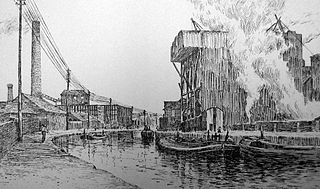Related Research Articles
The Leblanc process was an early industrial process for making soda ash used throughout the 19th century, named after its inventor, Nicolas Leblanc. It involved two stages: making sodium sulfate from sodium chloride, followed by reacting the sodium sulfate with coal and calcium carbonate to make sodium carbonate. The process gradually became obsolete after the development of the Solvay process.
Bill Quay is a residential area in Gateshead, located around 4 miles (6.4 km) from Newcastle upon Tyne, 12 miles (19 km) from Sunderland, and 17 miles (27 km) from Durham. In 2011, Census data for the Gateshead Metropolitan Borough Council ward of Heworth and Pelaw recorded a total population of 9,100.

The St Helens and Runcorn Gap Railway was an early railway line owned by a company of the same name in Lancashire, England, which opened in 1833. It was later known as St Helens Railway. It ran originally from the town of St Helens to the area which would later develop into the town of Widnes. Branches were opened to Garston, Warrington and Rainford. The company was taken over by the London and North Western Railway in 1864. The line from St Helens to Widnes and the branch to Rainford are now closed, the latter terminating at the Pilkington Glass' Cowley Hill works siding near Gerard's Bridge, but part of the lines to Garston and to Warrington are still in operation.

James Muspratt was a British chemical manufacturer who was the first to make alkali by the Leblanc process on a large scale in the United Kingdom.
Pelaw is a residential area in Gateshead, located around 3.5 miles (5.6 km) from Newcastle upon Tyne, 11 miles (18 km) from Sunderland, and 17 miles (27 km) from Durham. In 2011, Census data for the Gateshead Metropolitan Borough Council ward of Heworth and Pelaw recorded a total population of 9,100.

Holbrook Gaskell was a British industrialist, and an art and plant collector.

Charles Tennant was a Scottish chemist and industrialist. He discovered bleaching powder and founded an industrial dynasty.

Hazlehurst & Sons was a company making soap and alkali in Runcorn, Cheshire, England in the 19th century and in the early years of the 20th century. The family was also largely responsible for the growth of Methodism in the town during the 19th century.

Widnes is an industrial town in the Borough of Halton, Cheshire, England, which at the 2021 census had a population of 62,400.
Joseph Crosfield was a businessman who established a soap and chemical manufacturing business in Warrington, which was in the historic county of Lancashire and is now in the ceremonial county of Cheshire. This business was to become the firm of Joseph Crosfield and Sons.
Gossage is a family name of soapmakers and alkali manufacturers. Their company eventually became part of the Unilever group. During World War II, all soap brands were abolished by British government decree in 1942, in favour of a generic soap. When conditions returned to normal post war, the Gossage brand was not revived by Unilever though the company name is still registered for legal purposes. The online 'Times Index' shows meetings of the Gossage company board until the early 1960s.

William Gossage was a chemical manufacturer who established a soap making business in Widnes, Lancashire, England.

John Hutchinson was a chemist and industrialist who established the first chemical factory in Widnes, Lancashire, England. He moved from working in a chemical factory in St Helens and built his own chemical factory in 1847 in the Woodend area of Widnes near to Widnes Dock by the junction of the Sankey Canal and the River Mersey. In this factory he manufactured alkali by the Leblanc process.

Henry Deacon was a chemist and industrialist who established a chemical factory in Widnes, Lancashire, England.
Frederic Muspratt was a chemist and industrialist who established a chemical factory in Widnes, Lancashire, England.
Richard Muspratt was a chemical industrialist.
Edmund Knowles Muspratt was an English chemical industrialist.
Neil Mathieson was a Scottish chemist and businessman.

Charles Wigg was an English manufacturer of chemicals in Runcorn, Cheshire, England. After working as an export agent in Liverpool he joined with two managers of a Runcorn chemical factory to build what was initially known as the Old Quay Chemical Works, and later became Wigg Works. At first the works manufactured soap and alkali, but soon moved to extracting copper from pyrites ash, and later making bleaching powder and ferric oxide. During the later part of the 19th century it was one of the most successful businesses in Runcorn. Charles Wigg retired from the business shortly after it was taken over by the United Alkali Company and died eight years later. The site of the factory has been developed into a nature reserve called Wigg Island.
Duncan McKechnie was a British chemical manufacturer and metal extractor. He was trained as a soap boiler in Glasgow and later moved to become a foreman at a soap and alkali factory in Runcorn, Cheshire. In 1869 he entered into partnership with two colleagues to run a new chemical factory in the town, but soon left to found his own company in St Helens. This company specialised in extracting and refining metals. It was sold to the United Alkali Company in 1891. After McKechnie's retirement his descendants continued to run factories bearing the name McKechnie into the 20th century.
References
- ↑ "Fleetwood's Maritime Heritage". United Alkali. 2012. Retrieved 21 March 2012.
- ↑ "IMPERIAL CHEMICAL INDUSTRIES PLC; ARCHIVES OF BRUNNER, MOND AND COMPANY LTD AND ITS SUBSIDIARIES". The National Archives. Retrieved 21 March 2012.